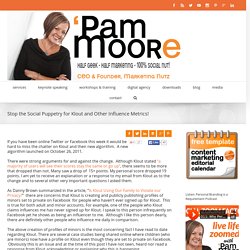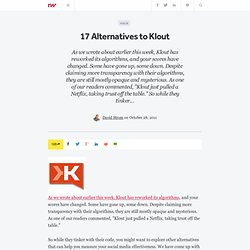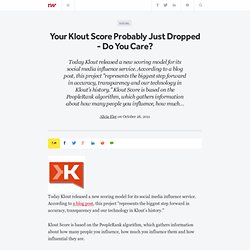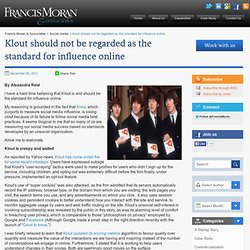

Stop the Social Puppetry for Klout and Other Influence Metrics. If you have been online Twitter or Facebook this week it would be hard to miss the chatter on Klout and their new algorithm.

A new algorithm launched on October 26, 2011. There were strong arguments for and against the change. Although Klout stated “a majority of users will see their scores stay the same or go up”, there seems to be more that dropped than not. Many saw a drop of 15+ points. My personal score dropped 19 points. 17 Alternatives to Klout. As we wrote about earlier this week, Klout has reworked its algorithms, and your scores have changed.

Some have gone up, some down. Despite claiming more transparency with their algorithms, they are still mostly opaque and mysterious. As one of our readers commented, "Klout just pulled a Netflix, taking trust off the table. " So while they tinker with their code, you might want to explore other alternatives that can help you measure your social media effectiveness. We have come up with 17 different services, some free, some fairly expensive. Before I run through the services, let's discuss eight different issues with social media metrics and how the ideal metric should be constructed. There is no single number that can really be universally useful. Your Klout Score Probably Just Dropped - Do You Care? Today Klout released a new scoring model for its social media influence service.

According to a blog post, this project "represents the biggest step forward in accuracy, transparency and our technology in Klout's history. " Klout Score is based on the PeopleRank algorithm, which gathers information about how many people you influence, how much you influence them and how influential they are. "Influence is the ability to drive action and is based on quality, not quantity," writes Klout Director of Ranking Ash Rust. "When someone engages with your content, we assess that action in the context of the person's own activity. " Why Klout scores are possibly evil - Nov. 15. John Scalzi is the author of Old Man's War and other science fiction novels.
He runs a blog, Whatever, where this commentary originally appeared. I got a Klout account a few months ago when it did that promotion of allowing its members to get an early view of the U.S. version of Spotify, and that was reason enough to give it a spin. Well, I still have my Spotify account, but this morning I deleted my Klout account. Part of that was due to the various kvetches I've seen regarding Klout's rather lackadaisical approach to privacy, noted by everyone from Charlie Stross to The New York Times -- but really, at the end of the day (or the beginning of it, as I deleted the account this morning), I left Klout because I suspect the service is in fact a little bit socially evil. Klout to Ask Users to Trade Influence for Equity in Startups. Klout is partnering with a startup called Wahooly to offer high-ranking members the ability to become investors in startups in return for helping publicize the young companies.

In about two weeks, Klout will approach users with a score of 45 or more to check out Wahooly. In January, those users who opt in will be able to choose from 200 startups in which they'd like to invest. Dana Severson, founder of Wahooly (the name refers to the wahoo, arguably the world's fastest fish, which travels in schools), gave the following hypothetical example of how the service will work: White Horse reveals weaknesses of social influence metrics such as Klout and shows additional measurement required - White Horse. Klout should not be regarded as the standard for influence online. By Alexandra Reid I have a hard time believing that Klout is and should be the standard for influence online.

My reasoning is grounded in the fact that Klout, which purports to measure social media influence, is losing clout because of its failure to follow social media best practices. It seems illogical to me that so many of us are measuring our social media success based on standards developed by an unsocial organization. Allow me to elaborate. Klout is creepy and walled As reported by Yahoo news, Klout has come under fire for some recent missteps. Klout’s use of “super cookies” was also attacked, as the firm admitted that its servers automatically record the IP address, browser type, or the domain from which you are visiting, the web pages you visit, the search terms you use, and any advertisements on which you click. Experts differ on Klout's clout.
Popular social media "influence" firm Klout, took some knocks this week from folks angry about its changes.

An early social media application used to influence people. The San Francisco-based firm produces a "Klout Score", from 1 to 100, indicating the (you guessed it) clout of folks across the social media talk-o-verse of Twitter, Facebook and sundry settings for our current era of computer-assisted solipsism. "The Klout Score measures influence based on your ability to drive action," says the firm. But due to a tweak this week in the formula the firm uses to calculate its scores, some folks saw their numbers drop 10 to 20 points in a widely-lamented leap. "The problem is that Klout's new scoring method is neither more accurate nor more transparent," said Brand&Capture's John McTigue, in a commentary critical of the change. Well who cares? Is @Klout Using Our Family to Violate Our Privacy? First, apologies to anyone suffering Klout burnout here – but sometimes a topic has more than just a simple viewpoint.

Especially when that topic is something like online privacy.